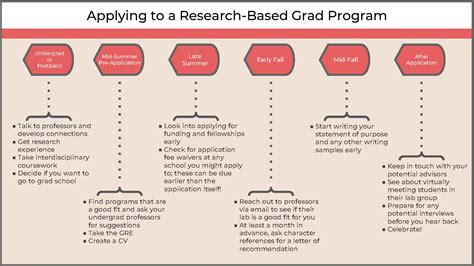Deciding how many graduate programs to apply to is a crucial step in the application process. The number of applications you submit can significantly impact your chances of admission and the overall stress and workload you face during the application season.

Before determining the number of programs to apply to, consider the following factors:
Your Qualifications
- GPA and GRE/GMAT scores: Strong academic credentials can increase your chances of admission, allowing you to apply to a wider range of programs.
- Research experience and publications: Relevant research experience and publications demonstrate your academic competence and potential for success in graduate studies.
Your Interests and Goals
- Field of study: Determine the specific field of study you wish to pursue and identify the graduate programs that best align with your interests.
- Program type: Consider whether you prefer a research-focused or professional program with different coursework and career paths.
- Location: Factor in the location of the graduate programs and how it aligns with your career aspirations and personal preferences.
The Competition
- Program selectivity: Research the acceptance rates of the programs you are considering to gauge the level of competition.
- Number of applicants: Estimate the number of applicants for each program to determine how competitive the application pool will be.
Your Time and Resources
- Application deadlines: Ensure you have sufficient time to complete multiple applications while balancing other commitments.
- Application fees: Graduate school applications can incur significant fees. Estimate the total cost of applying to multiple programs.
Based on the aforementioned factors, the recommended number of graduate programs to apply to varies widely. However, here are some general guidelines:
- Highly competitive programs: Apply to 8-12 programs if you have strong qualifications and multiple years of research experience.
- Moderately competitive programs: Apply to 5-8 programs to increase your chances of admission.
- Less competitive programs: Consider applying to 3-5 programs if you have solid qualifications or are willing to relocate for a specific program.
| Qualification Level | Recommended Number of Applications |
|---|---|
| Exceptional GPA and GRE/GMAT scores, extensive research experience | 8-12 |
| Solid GPA and GRE/GMAT scores, some research experience | 5-8 |
| Average GPA and GRE/GMAT scores, limited research experience | 3-5 |
| Program Selectivity | Recommended Number of Applications |
|---|---|
| Highly selective | 8-12 |
| Moderately selective | 5-8 |
| Less selective | 3-5 |
| Field of Study | Recommended Number of Applications |
|---|---|
| STEM | 8-12 |
| Humanities | 5-8 |
| Social Sciences | 3-5 |
| Location Preference | Recommended Number of Applications |
|---|---|
| Specific region or city | 3-5 |
| Multiple locations | 5-8 |
| Any location | 8-12 |
- Increased chances of admission: Applying to multiple programs increases your likelihood of receiving an offer of admission, especially if you are not highly competitive.
- More interview opportunities: Each additional program you apply to represents another potential interview opportunity, providing you with valuable practice and exposure to different universities.
- Greater flexibility: Applying to multiple programs gives you more options and allows you to choose the best fit based on your needs and interests.
- Reduced stress: Submitting more applications can spread out your workload, reducing the stress of completing multiple applications simultaneously.
- Time-consuming: Applying to multiple programs can be an extensive and time-consuming process.
- Costly: Graduate school applications often incur application fees, which can add up if you submit several applications.
- Mentally and emotionally draining: The application process can be challenging and may take an emotional toll.
- Potential for rejection: Applying to more programs means facing the possibility of multiple rejections, which can be discouraging.
Can I apply to more than 12 programs?
Yes, you can apply to more than 12 programs, but it is generally not recommended for several reasons. It can become overwhelming to manage multiple applications, and the additional cost may not be justified by the increased chances of admission.
Should I apply to programs that are not a perfect fit?
Consider applying to a few “safety” programs that may not be your top choices but still align with your interests and goals. This can increase your chances of receiving an offer and provide you with a backup option.
How can I generate ideas for additional applications?
- Attend graduate school fairs: Network with university representatives and explore different programs that you may not have initially considered.
- Consult with your undergraduate advisors: Seek guidance from professors who are familiar with graduate school applications and can suggest suitable programs.
- Explore online resources: Utilize databases and search engines to access information about graduate programs and potential matches.
- Consider “Blue Sky“ applications:** Apply to one or two programs that may be outside your comfort zone but that align with your long-term career aspirations. This creates the potential for new opportunities and growth.
What should I do if I am rejected from all the programs I apply to?
If you are not admitted to any graduate programs, do not be discouraged. Consider the following steps:
- Analyze your applications: Identify areas where you may have fallen short and make improvements for the next application cycle.
- Seek feedback: Request feedback from admissions committees to gain insights into your application and potential areas for growth.
- Explore alternative pathways: Consider applying to different types of graduate programs or pursuing non-traditional career paths.
- Reassess your goals: Reflect on your career aspirations and determine if graduate school is still the best path for you.
